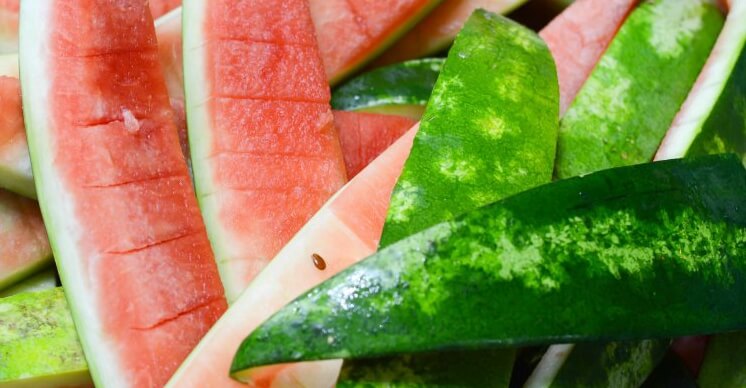On this website, we have already written not only about the health benefits of watermelon but also the health benefits of watermelon seeds. While thinking that we are done writing about watermelon, here we are once again, writing about watermelon but this time the topic is watermelon rind and its health benefits.
The majority of people throw away the tough outer layer of watermelon without a second thought, and you might be one of them.
This is quite understandable though owing to the fact that many people don’t know even whether watermelon rind is safe to eat, let alone knowing its health benefits.
So, before we continue further let us say “Yes, watermelon rind is totally edible”. Just make sure the rind is free from herbicides, pesticides and is well-washed.
That being said, it’s not a good idea to claim; watermelon rind is the tastiest part of the fruit.
However, when it comes to providing nutrients, therefore health benefits to the human body; watermelon rind can be as nutritious and beneficial as other parts of the watermelon, namely pink flesh and black seeds.
In fact; the rind might even be a better source of antioxidants and bioactive compounds compared to the pink flesh and seeds.
In this article, we will discover evidence-based as well as potential health benefits of the watermelon rind. But, before diving into it, we should look at the rich nutrient content of the rind as it will give us a clue about why watermelon rind is associated with various health benefits.
Nutritional Profile of Watermelon Rind
Just above we suggested that a watermelon rind can be as healthy as watermelon flesh and seeds thanks to its nutrient content.
So, what are these nutrients that make the rind worth eating despite its somewhat tangy flavour? In this section, we will look at a table that illustrates the main nutrients present in the watermelon rind.
However, apart from the nutrients shown in the table; we should know watermelon rind contains the following organic compounds, too (1),(2).
- chlorophyll
- citrulline
- lycopene
- flavonoids
- phenolic
While watermelon rind offers various essential nutrients, it is particularly rich in copper, manganese, Vitamin B6, Vitamin C, and Vitamin A (1).
Here is the table that illustrates the main nutrient available in ( serving size ) 100 gr of watermelon rind (1) :
| NUTRIENT | AMOUNT | DAILY VALUE % |
|---|---|---|
| Iron | 1.29 mg | 16% |
| Phosphorus | 135.24 mg | 19% |
| Zinc | 1.29 mg | 11% |
| Copper | 0.45 mg | 50% |
| Manganese | 1.42 mg | 61% |
| Calcium | 29.15 mg | 3% |
| Vitamin B1 (Thiamin) | 1.23 mg | 102% |
| Vitamin B2 (Riboflavin) | 2.71 mg | 208% |
| Vitamin B3 (Niacin) | 4.25 mg | 26% |
| Vitamin B6 (Pyridoxine) | 5.34 mg | 410% |
| Vitamin C (Ascorbic acid) | 8.46 mg | 9.50% |
| Vitamin A ( Retinol ) | 52130 µg |
As for the calorie amount; according to Live Strong: A 1-inch cube of watermelon rind contains 1.8 calories (3).
Health Benefits of Watermelon Rind
Now that we have examined the nutritional profile of watermelon rind and understood that it contains many essential nutrients, we can focus on the health benefits that watermelon peel has to offer.
Here are the 7 convincing reasons why you should consider adding watermelon rind to your diet instead of sending it to the garbage.
1- Good for Digestion
If you often suffer from digestive problems like constipation or diarrhoea, then you have a great reason to consume watermelon rind.
You may want to ask why. The answer is really simple. Watermelon rind contains a significant amount of fibre (4).
When it comes to digestion, fibre is arguably the first nutrient that comes to mind. Because it plays a major role in digestive health by keeping the digestive tract functioning (5).
Therefore, it is safe to say that eating fibre-rich foods is one of the most effective ways to keep digestive problems at bay.
While fibre is necessary for digestion overall, this nutrient is particularly effective against constipation, as it bulks to stool and softens it, which in turn, makes it easier to pass (6).
It is claimed that 95% of Americans do not consume a sufficient amount of dietary fibre (7), (8). That piece of information may explain why digestive problems are becoming more and more common.
So, instead of throwing it away, consider eating the fibre-rich watermelon rind. It can contribute to your digestive system significantly.
2- Watermelon Rind Lowers Blood Pressure
Since high blood pressure can lead to serious health conditions such as heart attack and stroke, it is important to keep the blood pressure under control (9).
While there are many ways to lower blood pressure, one of the most effective ways to regulate blood pressure is to eat the right foods (10).
Then the question is ” Is watermelon rind one of the right foods to eat in order to lower blood pressure?”.
The answer is: that all parts of watermelon including the rind can improve blood pressure, according to growing evidence. Let’s cite some of the studies and research that have something to say about watermelon rind’s blood pressure improving effect.
In one study; researchers concluded that watermelon rind meatball can potentially show a beneficial effect on hypertension. They attributed watermelon rind’s potential blood pressure-lowering effect to its citrulline and high fibre content (11).
In another study; researchers aimed to evaluate the effectiveness of supplementation with watermelon extract on blood pressure. And, the results showed that supplementation with watermelon extract lowered blood pressure in people with hypertension (12).
On the other hand, the potassium content is another reason why watermelon rind is associated with improved blood pressure (13),(14),(15).
The conclusion is obvious; watermelon rind, which was once worth nothing but garbage for you, now can be your weapon to lower your high blood pressure. Bear in mind, that watermelon flesh and seeds are also good for high blood pressure.
3- Watermelon Rind is Good for Your Skin
Everyone desires to have good-looking skin, especially in this appearance-oriented modern world. Although watermelon rind won’t magically and instantly give you perfect skin, it can prevent you from developing certain skin problems, thus contributing to your appearance.
So, what are these skin problems and how eating watermelon rind can protect your skin?
Watermelon rind may prevent you from developing skin problems that occur due mainly to free radicals such as wrinkles, dark spots and saggy skin.
By doing what? Obviously; by supplying some bioactive compounds that have antioxidants property such as lycopene and flavonoids. These compounds have been shown to combat free radicals by multiple studies (16),(17).
In addition to these compounds; vitamin C that abounds in watermelon rind can also support your skin health by stimulating collagen production. Briefly; collagen strengthens skin and provides both elasticity and hydration (18).
It is worth noting that; 100 gr watermelon rind can give you almost 30% of your daily vitamin C need (1).
You might not like the taste of raw watermelon rind, however, its potential benefits for the skin can convince you to add it to your diet.
4- May increase Libido
Here is arguably the most famous benefit of eating watermelon rind! So, can eating watermelon rind actually boosts libido in men?
Studies suggest that consuming watermelon rind MAY increase sex drive in men with erectile dysfunction.
One study – although this study wasn’t about watermelon rind and its effect on libido – showed that taking L-citrulline ( abounds in watermelon rind ) supplements can improve erections in patients with mild erectile dysfunction (19).
In another study; researchers evaluated the effectiveness of watermelon rind on sexual behaviours on rats and concluded that “our findings support the use of watermelon flesh for increasing potency in males“ (20).
Studies point out that eating watermelon rind might be an effective way to boost libido, especially in patients with erectile dysfunction.
5- May Reduce Cancer Risk
Unfortunately, there is no specific food or drink that can provide 100 per cent protection against cancer. However, there are certain compounds that are proven to combat cancer-causing pathogens. And, watermelon rind contains some of these cancer-fighting compounds.
These compounds are phenolic and lycopene, both of which exist in watermelon rind.
Multiple studies tell us that Lycopene has the ability to inhibit cancer cell growth, especially lung and prostate cancer (21),(22),(23).
On the other hand; similar studies demonstrate that phenolics can inhibit tumour growth by enhancing the body’s immune system (24),(25).
Although these and similar studies are promising, there is no particular study/studies ( or we don’t know ) that show the effectiveness of watermelon rind on cancer. So, let’s say watermelon rind may help your body to stay strong against cancer cells thanks to its bioactive compounds.
6- May Help with Weight Loss
If your goal is to lose weight, then eating watermelon rind can help you achieve it. If you are asking how? Because watermelon rind contains a significant amount of fibre, plus it is quite low in calories.
As mentioned above fibre is good for digestion. Another property of fibre though is being able to keep you full for long hours, thus preventing you from eating excess calories during the day.
Needless to say; if you are spending more energy (calories) than you are taking, then you are very likely to lose weight.
Speaking of calories, watermelon rind gives you a minuscule amount of calories. And, that is what you’d need while striving to lose weight. To be more exact: a 1-inch cube of watermelon rind contains 1.8 calories (3).
So, if you are on a weight loss program, watermelon rind can be a smart snack choice for you thanks to its high fibre and low-calorie amount.
7- May Boost Your Immune System
You shouldn’t be surprised to hear that watermelon rind is potentially an immune booster, given the fact that 100 gr of it gives 30% of your body’s vitamin C needs. After all, almost all of us know vitamin C is essential for the immune system.
Vitamin C supports the immune defence by enhancing various cellular functions of both the innate and adaptive immune systems (26).
But, make no mistake, vitamin C is not the only nutrient in the rind that can support your immune functions. Rich antioxidant and vitamin A content of watermelon rind can also play a significant role in keeping your immune system strong (27),(28),(29).
It appears that consumption of watermelon rind can support your immune system. Eat-in moderation to reap this benefit.
How to Eat Watermelon Rind
As mentioned at the beginning of the article many people don’t even know whether eating watermelon rind is safe to eat. Therefore, if you don’t know how to eat watermelon rind you should be forgiven and should know that you are not alone.
So, in this section, we will talk about how to eat watermelon rind.
However, if you live/lived in the southern states of the U.S, then you’d know how to eat watermelon rind.
1- Pickled
Just as raw watermelon rind, pickled watermelon rind as well is good for you. And, it is important to underline that pickled watermelon rind is common in southern states of the U.S.
If you want to pickle a watermelon rind and don’t know how to do it, here is a recipe that can help you prepare it.
2- Juiced
If you want to cool yourself down on a hot summer day and also want to get some necessary nutrients to your body, then you should consider juicing watermelon rind.
As for how you can prepare; throw cut watermelon rinds in your blender and add something to add flavours such as cider vinegar or mint. The juice will be both tasty and healthy.
3- Add to Salads
If you want to consume watermelon rind but its taste is discouraging you a bit, then you should consider adding it to your salad and mix it with other healthy and tasty ingredients.
Side Effects of Watermelon Rind
Although eating watermelon rind is safe for most people, there are things to keep in mind. Here are the potential side effects of eating watermelon rind.
- Even though the high fibre content of watermelon rind can help lower blood sugar, we want to encourage those with diabetes to talk to their health care providers to learn whether or not eating watermelon is okay.
- Since watermelon rind is rich in fibre, when consumed in excess it can lead to diarrhoea.
- If you have a spleen or stomach issue, avoid eating too much watermelon rind.
Final Thoughts
It is totally up to you whether you eat or discard the watermelon rind. What we tried to achieve in this article was to show the health benefits of watermelon, which the majority of people around the world are not aware of.
So, the 7 evidence-based health benefits of the watermelon rind that we looked at together in this article showed that watermelon rind can be as healthy as a fruit that you would eat on a regular basis.
As we always say whatever you eat, eat in moderation to reap the benefits.
Tarkan is an experienced health writer ( currently more than 600 articles ) and also the founder of this website namely www.neededforhealth.com. His expertise in health stems from in-depth medical research and knowledge which he obtained over the course of many years.
Tarkan enjoys sharing factual knowledge on health, psychology and nutrition. He always aims to deliver evidence-based recommendations, provide links to related scientific studies.





